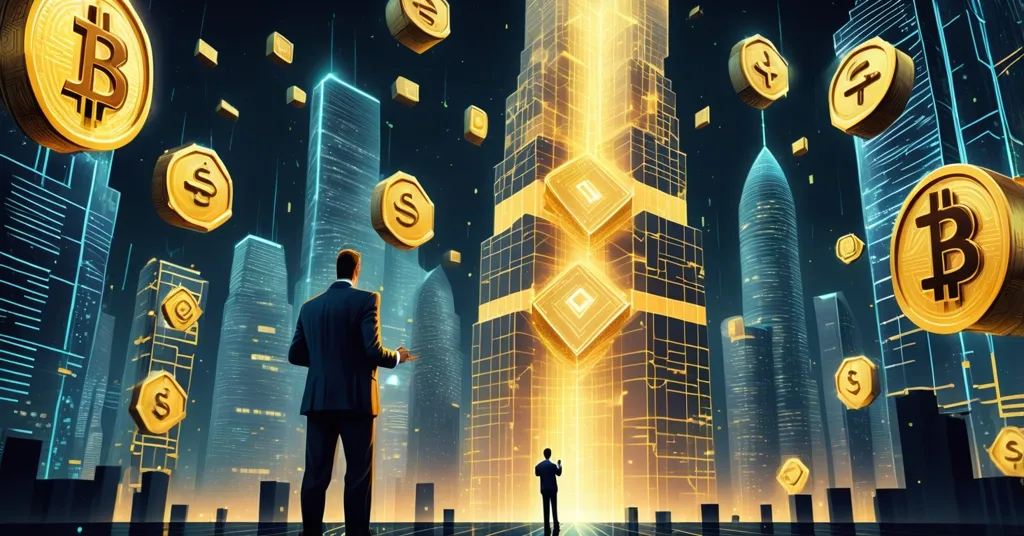Trump’s $57M Crypto Payday: DeFi Boost or Political Peril?

Trump’s $57M Crypto Haul: A Game-Changer for DeFi or a Political Minefield?
Donald Trump has just made headlines with a jaw-dropping $57.4 million payday from World Liberty Financial, a decentralized finance (DeFi) project, according to a recent SEC filing. As a former U.S. President and current political heavyweight, his deep dive into crypto isn’t just a personal financial win—it’s a signal that could reshape the regulatory landscape, spark mainstream interest, and potentially boost emerging projects like Mutuum Finance (MUTM). But with ethical controversies and speculative hype swirling, is this the catalyst crypto needs or a disaster in the making?
- Trump’s Crypto Windfall: Earned $57.4 million from World Liberty Financial with 15.75 billion governance tokens.
- Policy Shift Potential: Promises to make the U.S. the “crypto capital,” reversing past restrictions.
- Mutuum Finance in Focus: Could this DeFi presale project, raising $10.8M, ride a regulatory tailwind?
Trump’s Crypto Power Play: What We Know
Let’s break down this bombshell. Trump’s involvement with World Liberty Financial, a DeFi platform that pulled in over $550 million from investors, positions him as a major player in a space often associated with tech-savvy libertarians, not political titans. Holding 15.75 billion governance tokens through DT Marks DEFI LLC, Trump wields significant voting power in the project’s direction. For those new to the game, DeFi uses blockchain tech to offer financial services—think lending, borrowing, or trading—without banks or middlemen. Governance tokens are like digital ballots, giving holders a say in how these platforms evolve. Reports indicate Trump’s family stake started at 75%, shrinking to 40% by mid-2025, hinting at major financial moves, possibly netting up to $190 million collectively, with Trump potentially pocketing $135 million as detailed in his SEC filing. A political figure banking this much from crypto while in the spotlight? That’s a plot twist even Hollywood couldn’t script.
But there’s more to unpack. Trump’s crypto footprint isn’t new—he’s previously reported income from NFTs (unique digital assets often tied to art or collectibles), though the latest filing shows no fresh NFT revenue. His fingerprints remain on various digital ventures, painting him as both a pioneer and a lightning rod in a sector craving legitimacy, with broader context available on his cryptocurrency involvement. The kicker? Unlike the prior administration’s iron-fisted approach—think SEC crackdowns and regulatory limbo—Trump has vowed to transform the U.S. into the “crypto capital of the world.” With the Senate greenlighting a stablecoin regulatory framework in June 2025, sending stocks like Circle soaring by 34%, there’s real momentum behind his words. Yet, before we start chanting “to the moon,” let’s ground ourselves. Senators Elizabeth Warren and Jeff Merkley have branded World Liberty Financial a “vehicle for corruption,” citing foreign ties like a $2 billion Emirati-backed MGX fund deal involving the project’s USD1 stablecoin. Add in questions about the U.S. Constitution’s emoluments clause, which bars officials from accepting foreign payments, and you’ve got a mess stickier than a hacked exchange.
DeFi 101: Unpacking the Basics for Newcomers
For those just dipping their toes into crypto, let’s simplify some terms. DeFi, or decentralized finance, is like a bank without a building—everything runs on blockchain code, letting you lend, borrow, or trade directly with others worldwide. Governance tokens? Think of them as your membership card to a club where you vote on big decisions. Stablecoins, like World Liberty’s USD1, are crypto coins pegged to something stable (often the dollar) to avoid wild price swings, often earning revenue from underlying deposits. These concepts are the backbone of projects Trump is tied to, and they’re key to understanding why his involvement matters.
Crypto Policy: A Turning Point or Political Theater?
Trump’s crypto-friendly rhetoric could be a watershed moment for blockchain adoption. If he delivers on promises to dismantle restrictive policies, we might see clearer guidelines, less SEC harassment, and a surge in investor confidence. This isn’t just about DeFi—it’s about legitimizing a technology that could bank the unbanked, speed up global transactions, and sidestep traditional finance’s red tape. Stablecoins, for instance, offer a bridge between volatile crypto and real-world spending, and with political backing, they could become commonplace. But let’s not get starry-eyed. Opposition from Senate Democrats, who’ve already proposed the “End Crypto Corruption Act” to bar officials from endorsing crypto assets, shows this is no slam dunk. Ethical red flags around foreign influence in Trump’s ventures could taint the space’s reputation, turning a potential win into a political football, as explored in this expert analysis on regulatory outlook. Is this the dawn of a decentralized utopia, or just another campaign promise destined to fizzle?
Mutuum Finance: Hype or Hope for Decentralized Lending?
While Trump’s windfall dominates the news, smaller DeFi players like Mutuum Finance (MUTM) are hoping to catch a similar wave of momentum. Currently in phase 5 of its token presale, MUTM has raised over $10.8 million from 12,200 unique buyers at $0.03 per token—a 20% bump from phase 4. Another 40% of this phase’s tokens sold in just two weeks, with a planned 16.67% price hike looming, as discussed in community reviews on Reddit. On paper, MUTM targets a core DeFi niche: non-custodial lending and borrowing. This means users keep control of their funds (no third-party holding your crypto), with loans and repayments handled by smart contracts—code that executes rules automatically. MUTM touts smarter use of funds through variable interest rates that shift based on how much money is in use, plus strict loan-to-value (LTV) ratios to prevent risky over-borrowing. Simply put, LTV limits how much you can borrow against your collateral, reducing the chance you’re wiped out if prices drop.
They’re also leveraging Chainlink data feeds—think of these as trusted messengers delivering real-time price info to the blockchain—to ensure fair asset valuations, with backup systems for reliability. It sounds slick, and in a world where DeFi could explode under lighter regulation, MUTM might find its footing. But let’s pump the brakes. Presale hype trains often crash hard, and community chatter flags MUTM as a potential risk, with ongoing scam concerns that can’t be ignored. Without a proven track record, a transparent team, or third-party audits, it’s just another shiny promise in a sea of altcoin speculation. Bitcoin maximalists like myself can’t help but smirk—Bitcoin is the gold standard of decentralized money, a battle-tested store of value. DeFi projects like MUTM might fill niches Bitcoin doesn’t touch, but they’re lightyears from its security and staying power.
Risks and Reality Check: Don’t Drink the Kool-Aid
So, could Trump’s crypto clout and policy swagger supercharge projects like MUTM? Maybe, in a broad sense. A less hostile U.S. regulatory climate could unleash innovation and draw more capital to DeFi, especially for altcoins carving out specialized roles. Ethereum and other blockchains have proven their worth in powering smart contracts—something Bitcoin isn’t built for—and startups like MUTM could thrive in lending markets if they actually deliver. But tying MUTM’s fate directly to Trump’s actions is flimsier than a cheap hardware wallet. There’s no evidence his involvement lifts unrelated projects, and wild claims of “20x gains” are straight-up shilling garbage. Cut the nonsense. Presale tokens are a gamble—many flop, disappear with investor money, or get crushed by regulators, with inherent risks in DeFi investments that must be considered. MUTM’s rapid token sales scream hype, not substance, and scam warnings can’t be ignored.
Then there’s the elephant in the room: Trump’s own crypto ventures are drowning in controversy. Senate backlash over foreign ties, stake sell-offs during his presidency, and legal questions about foreign payments paint a troubling picture, further highlighted by reports on his massive crypto windfall. Does his involvement legitimize crypto, or does it drag it into a swamp of political baggage? DeFi’s broader risks—market volatility, untested protocols, regulatory blind spots—only add to the skepticism. We’re all for effective accelerationism, pushing tech forward to disrupt the status quo, but not by ignoring the dark side or buying into every shiny narrative. Decentralization, privacy, and financial freedom are worth fighting for, just not with blind faith.
Key Questions and Takeaways on Trump’s Crypto Impact and DeFi’s Path Forward
- What does Donald Trump’s $57 million crypto payday mean for blockchain adoption?
It could spark mainstream interest in DeFi, showing even political giants see value in blockchain, but risks politicizing a space built on independence, potentially alienating its core community. - How might Trump’s crypto policy promises shape DeFi regulations in 2025?
His push to make the U.S. a “crypto capital” hints at fewer restrictions, possibly easing growth for DeFi, though fierce opposition from Senators like Warren signals a tough battle ahead. - Can projects like Mutuum Finance gain from Trump’s influence in crypto?
A friendlier policy environment might help DeFi startups like MUTM, with its $10.8M presale, but there’s no direct tie to Trump, and success depends on their own execution, not political hype. - What risks come with investing in DeFi presale tokens like MUTM?
High stakes include scams, project collapse, and regulatory uncertainty. MUTM’s fast sales must be weighed against unverified claims and community warnings of potential fraud. - How does Mutuum Finance aim to innovate in decentralized lending?
MUTM emphasizes user-controlled lending with dynamic rates, strict LTV limits to manage risk, and Chainlink for accurate pricing, though it faces stiff competition in a crowded DeFi arena. - Should the crypto community worry about political ties in blockchain projects?
Absolutely—ethical concerns over Trump’s foreign dealings and Senate corruption claims highlight risks of influence peddling, demanding vigilance to preserve crypto’s decentralized roots.
Navigating the crypto space means balancing the rush of innovation with a brutal dose of reality. Trump’s DeFi haul and bold promises might crack open doors for blockchain to challenge traditional finance, but they’re laden with ethical traps and uncertainty. Projects like MUTM could be part of a new financial frontier—or just another overhyped footnote. As advocates for decentralization and shattering outdated systems, we’re here to champion the potential of Bitcoin and beyond while calling out the nonsense. Stay sharp, dig deep, and let’s keep pushing for a freer, more private financial future.



